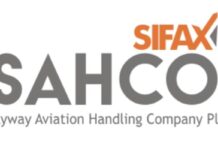
The chairman of West Link Airlines, Capt. Ibrahim Mshelia has made a case for the review of the procurement procedures and the operational duration or time limits of airline operator certificate (AOC) in Nigeria against the current practice of renewing the document every two years.
Mshelia who stated this at the 25th annual conference of the League of Airport and Aviation Correspondents (LAAC) held yesterday in Lagos, called for the amendment of the Civil Aviation Act.
He proposed that the AOC should have no expiry date unless suspended or revoked while the operational specifications only should expire biannually.
“There is a need to review the procurement procedures and the operational duration or time limits of AOC holders in Nigeria.
“The amendment of our act and policy in progress at the national assembly is not misplaced, therefore. Even before this bill is passed, the NCAA’s ability to make regulations can also be exploited to bring about these necessary changes required.
“The word AOC has been so over-valued like a village masquerade that appears once in five years. This is not supposed to be so. Operations specification in this regard is the masquerade and not the certificate.
“The AOC processing takes forever against the advertised. Proposals have been offered that need attention. The duration of AOC should be valid unless suspended or revoked.
“The operational specification is the operational document which should, and must be over sighted from time to time via audits. That should have the expiry date while the AOC certificate should remain valid unless suspended or revoked,” he said.
He said there is only one process for obtaining the AOC not minding whether the potential operator intends to be a small, medium or large operation.
“Under this system, little operators intending smaller segments of the sector are frustrated ab-initio. By ICAO standard, small, medium or large operations are supposed to exist within a civil aviation system. The models exist everywhere, example, air taxi, air charter, high value cargo ops, nonscheduled and scheduled operations etc.
“ICAO encourages no discrimination. No matter the size of a nation on the council. The organisation allows several models of sizes of the civil aviation authority a country can adopt; small, medium or large CAA.
“ICAO also expects performance variance with the various sizes yet, all are accepted into the comity of nations on as equals. In over sighting also, ICAO has developed Checklist for; small CAA, medium CAA or large CAA,” he added.
In his contribution, the chief executive officer of TAL Helicopters, Mr. Femi Adeniji, said AOCs in some countries like the United States AOCs are for life unless such an airline has issues, which grounds its operations for years.
He contended that the same could be replicated in Nigeria, and called on the Nigerian Civil Aviation Authority (NCAA) to amend its regulations and put them in tandem with developments around the world.
Adeniji frowned at the one-size-fits-all approach in the regulation saying such yardstick needed to be expunged for true development to set in.
In his address, the director general of NCAA, Capt. Musa Nuhu assured that the agency would do its utmost to accommodate all the stakeholders, including the airlines when all its plans are completed.
He said the agency had been repositioned for the effectiveness and efficiency of its statutory safety oversight function.
Nuhu listed some of the actions taken to include reducing the agency’s directorates from eight to six directorates to be more functionally responsive and flexible functionality, automation of internal process through the implementation change management and acquisition of appropriate ICT systems which was ongoing.
He also talked about the review and repositioning of the agency’s regional offices as tool to ensure oversight coverage of the entire nation and bringing it closer to all stakeholders instead of centralizing everything in one place.
Some other changes include “domestication of all inspector mandatory core courses, stakeholders’ consultation to review the current Nig.CARS to align with the new Civil Aviation Act taking into consideration new normal to promote the orderly growth of the industry especially general aviation which the key to a successful industry.
He further said “development of a medium and long term strategic plans in consultation with all relevant stakeholders and collaboration with other aviation agencies is in full gear for preparations for the ICAO Universal Safety Oversight Audit Programme in 2022”.



























































